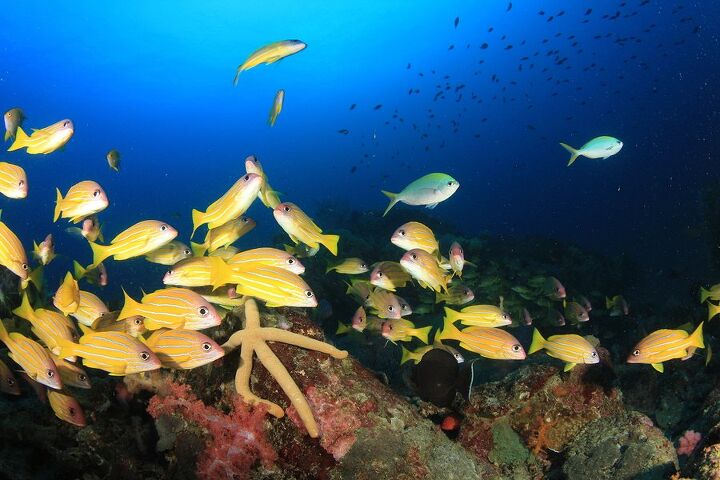Snappers


About Snappers
The species known as snappers belong to the Lutjanidae family of marine fishes which includes about 113 different species. These fish can grow up to 3.3 feet in length and they tend to travel in very large schools. Because these fish grow so large and need to be kept in groups, they quickly outgrow most aquariums. In terms of temperament, however, snappers are generally non-aggressive fish that do well in very large saltwater community tanks with other non-aggressive species.
Snappers are generally non-aggressive fish that do well in very large saltwater community tanks.
Snappers tend to inhabit the tropical and subtropical regions of all the world’s major oceans. These fish prefer to inhabit rocky or coral reefs where they can be found at depths around 100 meters or, in more open waters, at depths up to 500 meters.
With more than 100 species in existence, snappers exhibit a wide variety of colors and patterns. Some snappers are somewhat dull in coloration, exhibit various shades of silver, gray, tan, and brown while some species are brightly colored with blue or yellow stripes. Other colors you may see in various species of snapper include red, green, orange, pink, and purple.
One of the challenges with keeping snappers in the home aquarium is their size – they require very large tanks of 300 gallons or more in capacity. Different species of snapper come from different habitats, but most live in rocky or coral reefs so the tank should be sparsely decorated with live rock or hardy corals. These fish prefer tropical temperatures in the 72°F to 82°F range with a slightly alkaline pH range between 8.1 and 8.4 is ideal with moderate hardness between 8 and 12 dKH.
Different species of snapper come from different habitats, but most live in rocky or coral reefs.
When it comes to feeding habits, there are two types of snapper. Some snappers feed primarily on benthic invertebrates and small fish while others feed on plankton. Benthic feeders should be offered a variety of fresh and frozen foods including shrimp, worms, and clams as well as crustaceans like crabs and other invertebrates.
Also read: Setting a Schedule for Routine Tank Maintenance
Because snappers are a schooling fish, their breeding habits are somewhat unique. These fish tend to spawn in very large groups, releasing large quantities of eggs and sperm into the water all at once. Snappers tend to spawn several times throughout the season during the autumn and winter months.
There are about 113 different species of snapper, though not all of them are recommended for the aquarium trade. Some of the most popular species of snapper include the following:
- Bluestripe Snapper (Lutjanus kasmira)
- Threadfin Snapper (Symphorichthys spilurus)
- Emperor Snapper (Lutjanus sebae)
- Red Snapper (Lutjanus campechanus)
- Queen Snapper (Etelis oculatus)
- Yellowtail Snapper (Ocyurus chrysurus)
Photo credit: Rich Carey/Bigstock

Kate Barrington is the loving owner of two cats (Bagel and Munchkin) and a noisy herd of guinea pigs. Having grown up with golden retrievers, Kate has a great deal of experience with dogs but labels herself a lover of all pets. Having received a Bachelor's degree in English, Kate has combined her love for pets and her passion for writing to create her own freelance writing business, specializing in the pet niche.
More by Kate Barrington
























